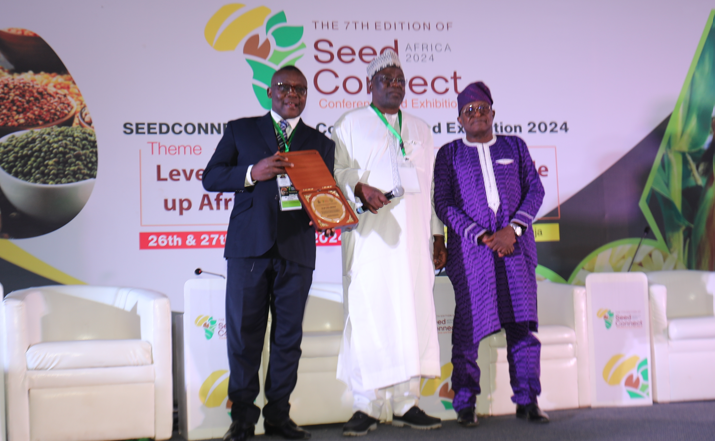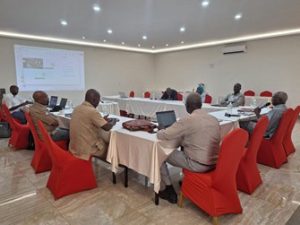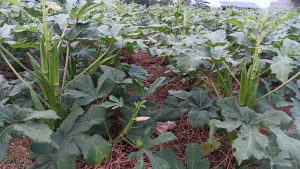TAAT receives award for championing sustainable seed systems across Africa

Technologies for African Agricultural Transformation (TAAT) ended the year 2024 on a high note with a recognition for its strategic contributions and commitment to building robust and sustainable seed systems across Africa.
Seed industry stakeholders and leaders presented the plaque of honour to TAAT at the 2024 Seed Connect Africa. The event which held at Abuja, Nigeria from 26-27th November 2024 marked the 7th edition of the annual Seed Connect Africa 2024, the premier conference and exhibition focused on enhancing agricultural productivity across the continent.
Dr Ishiaq Khalid, the Director General of Nigeria’s National Agricultural Seeds Council (NASC), while presenting the award to Mr Geoffrey Nsofon, TAAT’s Private Sector Engagement Specialist, lauded TAAT’s valuable footprint in facilitating sustainable seed systems in many African countries through its seed roadmap events in Sierra Leone, Liberia, Benin, Cameroon and Kenya, and path-breaking initiatives like the African Cereal and Legume Breeding Consortium (ACLBC) which is facilitating the sharing of genetic resources and breeding techniques for superior crop varieties with private seed companies while serving as an incubator for innovation in plant breeding technologies.
“It is noteworthy that TAAT, through its Country Engagement focus, has successfully integrated 236 seed-based technologies into 46 large scale investment projects across 34 African countries influencing a total value of $2.8 billion, Dr Khalid said.
Mr Nsofon, in his acceptance speech, expressed TAAT’s appreciation for the recognition and pledged TAAT’s continued support for aggregated efforts at transforming the seed landscape across Africa.
“TAAT through its ACLBC, created in collaboration with the African Seed Trade Association (AFSTA), is already scaling the adoption of elite varieties and hybrid seeds through defined protocols, facilitating farmer access to essential seed technologies,” Nsofon said.
” With 22 private seed companies adopting 40 climate-smart, TAAT-vetted seed technologies and
20 more cases of adoption in advanced stages, TAAT will continue to deepen its investments in robust and sustainable seed systems while leveraging the private sector to drive profitability and scalability of innovative technologies, Nsofon added.
Held under the theme, “Leveraging Seed Technology to Scale Up Africa’s Agricultural Productivity,” the Seed Connect Africa is an annual event organized by NASC in collaboration with the private seed companies with a view to providing a platform for major stakeholders within the industry to discuss various issues impacting players within the seed industry and design pathways for more resilient food systems.
Established in 2018 as a central pillar of the African Development Bank’s Feed Africa strategy, TAAT represents a transformative initiative to reverse the trend of declining food productivity in Africa through the scaling of modern food production technologies to 40 million farmers across Africa, focusing on supporting young people and women in low-income regions.
TAAT has scaled up the dissemination of heat-tolerant wheat varieties, drought-tolerant maize, high-yielding rice, cassava, high-iron bean, sorghum, millet, orange-fleshed sweetpotato varieties and high-quality livestock breeds, and fingerlings to more than 12 million farmers, boosting crop production by an estimated 25 million tonnes. This increase in food production is a testament to the programme’s effectiveness in enhancing agricultural productivity across the continent.
TAAT acquires cutting-edge technologies from developers and agricultural research institutions led by the CGIAR for several agricultural value chains covering crops, livestock and fisheries, vets them for scaling readiness and integrates them into its electronic technology catalogue.
TAAT engages governments to integrate proven technologies into their large-scale agricultural investment programmes and partner with the private sector to commercialise them.
Recent Stories
Related Stories
- How TAAT Orange-fleshed sweet potatoes sparked a wellness movement
- TAAT highlights innovative technologies to scale up agricultural productivity at SeedConnect Africa
- Africa targets high yields amidst climate resilience as new cereal and legume breeding consortium takes off
- TAAT Rallies Seed Actors at #SeedConnectAfrica
- BROWN WHEAT FIELD DAY: TAAT and Partners propel Nigeria towards Wheat Revolution






